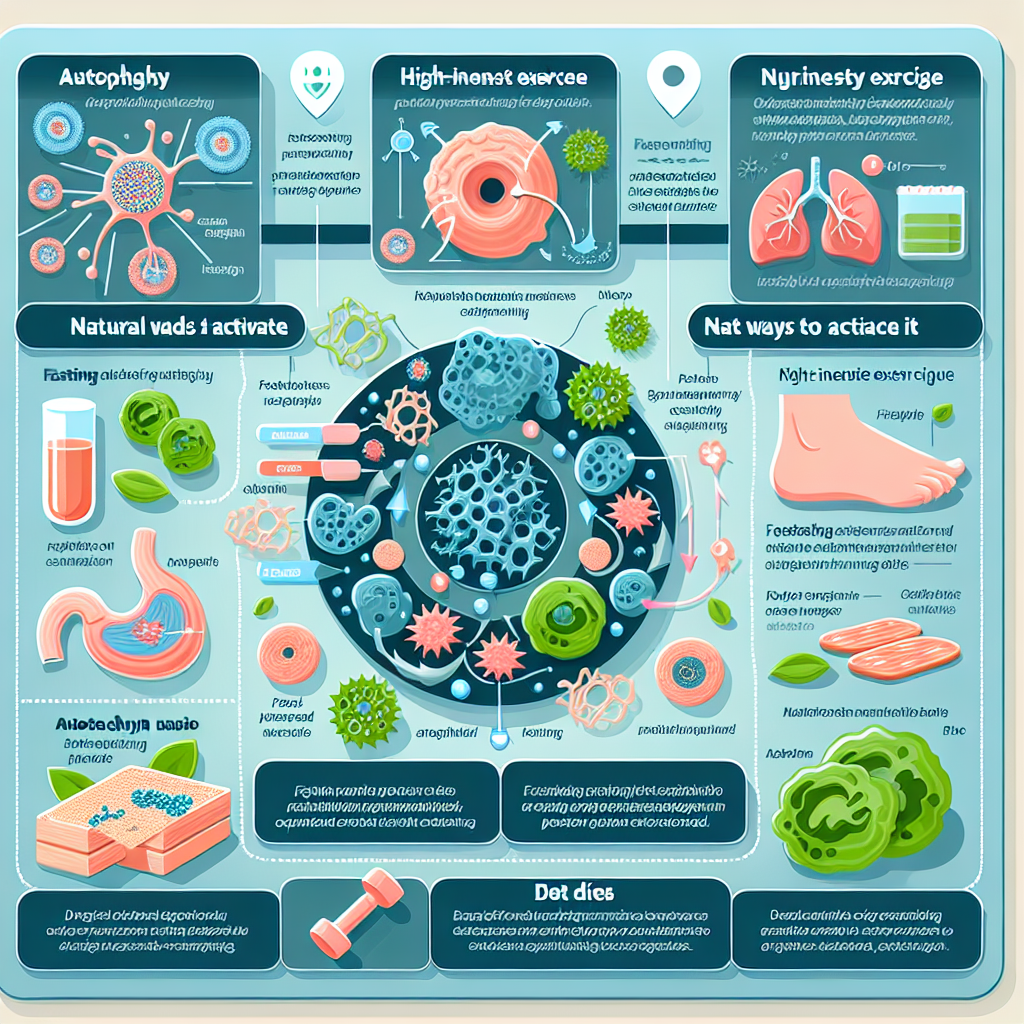Autophagy: What It Is and How to Activate It Naturally

Discover more about Autophagy: What It Is and How to Activate It Naturally. Learn the science behind it and how you can naturally stimulate this process for better health. Don’t wait, start your journey to a healthier you today. Click here to get started.
Understanding Autophagy: A Comprehensive Guide
Autophagy, a term derived from the Greek words “auto” meaning self and “phagy” meaning eating, is a natural process by which cells recycle their own components to provide the necessary building blocks for maintaining cellular functions and adapting to changing conditions. This process, discovered by Nobel laureate Yoshinori Ohsumi, is not only a recycling mechanism but also a quality control system within cells. It plays a crucial role in preventing diseases such as cancer, neurodegeneration, and infections.
Autophagy begins when the cell’s organelles, the parts of a cell that perform specific functions, are enveloped by a double-membrane structure known as an autophagosome. The autophagosome then fuses with a lysosome, an organelle filled with enzymes that break down and recycle cellular components. The contents of the autophagosome are degraded and the resulting molecules are released back into the cell to be reused. This process is essential for the cell’s survival during periods of stress or nutrient deprivation.
The importance of autophagy in human health and disease is increasingly recognized. Defects in autophagy are linked to a variety of diseases, including neurodegenerative disorders like Parkinson’s and Alzheimer’s, certain types of cancer, and even aging. On the other hand, enhanced autophagy can help protect against these diseases and promote longevity.
So, how can we activate autophagy naturally? One of the most effective ways is through fasting or calorie restriction. When the body is deprived of nutrients, it triggers autophagy as a survival mechanism to recycle cellular components and generate the necessary energy and building blocks. Intermittent fasting, where you cycle between periods of eating and fasting, is a popular method that has been shown to induce autophagy.
Exercise is another natural way to stimulate autophagy. During physical activity, the energy demand increases, leading to the breakdown of glycogen, a form of energy storage in cells. This process triggers autophagy to recycle the cellular components and provide the necessary energy. Regular exercise, therefore, can help maintain a healthy level of autophagy.
Certain nutrients and compounds can also induce autophagy. For example, resveratrol, a compound found in grapes and red wine, has been shown to activate autophagy. Similarly, curcumin, the active ingredient in turmeric, can stimulate autophagy and has been linked to various health benefits.
In conclusion, autophagy is a vital cellular process that helps maintain cellular health and prevent diseases. Fasting, exercise, and certain nutrients can naturally activate autophagy, offering a potential strategy to improve health and longevity. However, it’s important to note that while activating autophagy can have beneficial effects, excessive autophagy can also be harmful. Therefore, it’s crucial to maintain a balance and consult with a healthcare professional before making any significant changes to your diet or lifestyle.
Natural Ways to Activate Autophagy for Better Health

Autophagy, a term derived from the Greek words for “self” and “eating,” is a natural process by which cells recycle their own components to provide the necessary building blocks for maintaining cellular functions and adapting to changing conditions. This process is not only crucial for cellular health and longevity, but it also plays a significant role in preventing diseases such as cancer, neurodegeneration, and infections. Therefore, understanding how to activate autophagy naturally can be a powerful tool for enhancing overall health.
One of the most effective ways to stimulate autophagy is through fasting. When the body is deprived of nutrients, it initiates autophagy to recycle cellular components and generate the necessary energy and building blocks. Intermittent fasting, which involves alternating periods of eating and fasting, has been shown to be particularly effective in activating autophagy. This can be achieved by extending the overnight fast, eating only within a specific window of time each day, or fasting for an entire day once or twice a week.
Exercise is another natural activator of autophagy. During physical activity, the energy demand increases, leading to the depletion of cellular energy stores. This triggers autophagy, which helps to recycle damaged proteins and organelles and provide the necessary energy. Both aerobic exercises, such as running and cycling, and resistance exercises, like weight lifting, can stimulate autophagy. However, the intensity and duration of the exercise are important factors, with longer and more intense workouts generally leading to greater autophagy activation.
Diet can also influence autophagy. Consuming a diet rich in nutrient-dense, whole foods can support the autophagy process. In particular, foods high in polyphenols, such as berries, nuts, and green tea, have been shown to stimulate autophagy. On the other hand, a diet high in processed foods and sugars can inhibit autophagy. Therefore, adopting a balanced, healthy diet can be a natural way to support autophagy.
Sleep is another critical factor in autophagy. During sleep, the body undergoes various restorative processes, including autophagy. Lack of sleep or poor-quality sleep can disrupt these processes, leading to reduced autophagy. Therefore, ensuring adequate and quality sleep is essential for maintaining autophagy.
Finally, stress management can influence autophagy. While acute stress can activate autophagy, chronic stress can inhibit it. This is because chronic stress can lead to the overproduction of certain hormones that can disrupt autophagy. Therefore, managing stress through techniques such as meditation, yoga, or deep breathing can support autophagy.
In conclusion, autophagy is a vital cellular process that can be activated naturally through fasting, exercise, a healthy diet, adequate sleep, and stress management. By understanding and implementing these strategies, individuals can support their cellular health, potentially enhancing their overall health and longevity. However, it’s important to note that while these strategies can support autophagy, they are not a substitute for a healthcare provider’s advice. Therefore, individuals should always consult with a healthcare provider before making significant changes to their lifestyle or diet.
The Role of Autophagy in Disease Prevention and Treatment
Autophagy, a term derived from the Greek words for “self” and “eating,” is a natural process by which cells recycle their own components to provide the necessary building blocks for maintaining cellular functions and adapting to changing conditions. This process is not only crucial for maintaining cellular health, but it also plays a significant role in disease prevention and treatment.
Autophagy acts as a quality control mechanism within cells, eliminating damaged proteins and organelles that could otherwise accumulate and disrupt cellular functions. By doing so, it helps to prevent the onset of a variety of diseases. For instance, the accumulation of damaged proteins is a hallmark of neurodegenerative diseases such as Alzheimer’s and Parkinson’s. By clearing these harmful proteins, autophagy can potentially slow down the progression of these diseases.
Moreover, autophagy plays a pivotal role in the immune response, helping to eliminate intracellular pathogens and presenting antigens to the immune system, thereby enhancing immune surveillance. This makes it a key player in the fight against infectious diseases. Additionally, autophagy has been implicated in the prevention of cancer. It helps to maintain genomic stability and suppresses tumorigenesis by eliminating potentially harmful entities such as damaged mitochondria, which can produce reactive oxygen species that cause DNA damage.
Despite its role in disease prevention, autophagy is a double-edged sword. While it can suppress the formation of tumors, in established cancers, autophagy can have a protective effect on cancer cells, helping them survive in stressful conditions such as nutrient deprivation and hypoxia, which are common in the tumor microenvironment. Therefore, understanding the precise role of autophagy in cancer is crucial for developing effective therapeutic strategies.
So, how can we activate autophagy naturally to harness its disease-preventing benefits? One of the most well-known ways is through fasting or calorie restriction. When nutrients are scarce, cells ramp up autophagy to recycle components and provide the necessary building blocks for vital cellular functions. This is why intermittent fasting or periodic fasting is often associated with numerous health benefits, including improved metabolic health, enhanced longevity, and disease prevention.
Exercise is another natural way to stimulate autophagy. During physical activity, cells undergo stress, and autophagy is activated to remove damaged components and maintain cellular functions. Regular exercise, therefore, can help to keep our cells healthy and prevent disease.
Lastly, certain compounds found in foods can also activate autophagy. For instance, resveratrol, a compound found in grapes and red wine, has been shown to induce autophagy. Similarly, curcumin, the active ingredient in turmeric, can also stimulate this process.
In conclusion, autophagy is a vital cellular process with significant implications for disease prevention and treatment. By understanding how to activate it naturally through lifestyle modifications such as fasting, exercise, and diet, we can potentially harness its benefits for improved health and longevity. However, given its complex role in diseases such as cancer, further research is needed to fully understand how to optimally modulate autophagy for therapeutic purposes.